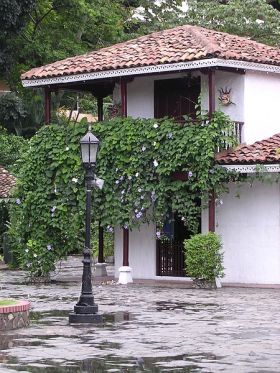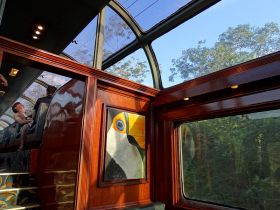Are there taxes other than Panamanian income taxes I have to be aware of?
Roy Cannon - Gestoria Cocle - main office in Penoneme
Yes, there are taxes other than Panamanian income taxes you have to be aware of.
If you are retired and not working, your taxes might include:
- Property tax on your land (if valued over $30,000) and house (if not exempt under a "new construction" scheme.
- Social Security tax if you have a maid or gardener who is an employee (works for you 3 or more days per week)
- Annual Franchise Fee (Tasa Unica) if you have formed a company to hold your property title (often done to avoid...
Yes, there are taxes other than Panamanian income taxes you have to be aware of.
If you are retired and not working, your taxes might include:
- Property tax on your land (if valued over $30,000) and house (if not exempt under a "new construction" scheme.
- Social Security tax if you have a maid or gardener who is an employee (works for you 3 or more days per week)
- Annual Franchise Fee (Tasa Unica) if you have formed a company to hold your property title (often done to avoid Panama Probate)
- Car license plate renewal on an annual basis (has to be done in the city where the car is registered, not where you live)
As an individual living in Panama, 100% of your income that is generated outside of the country is tax free in Panama. Bank account interest earned on local bank account and CD deposits is also tax free in Panama.
If you have a business that produces 100% of your income outside of Panama, you will owe no tax on your profits, but will be subject to Social Security and perhaps local municipal taxes. If your business has mixed income, partially generated in Panama, you pay taxes on this income, the foreign income continues to be tax free, for Panamanian purposes.
If you have a business that produces 100% of your income outside of Panama, you will owe no tax on your profits, but will be subject to Social Security and perhaps local municipal taxes. If your business has mixed income, partially generated in Panama, you pay taxes on this income, the foreign income continues to be tax free, for Panamanian purposes.
Posted February 4, 2013
Bill Hamilton - Bill Hamilton
 You have to pay your property tax every year in Panama. The amount you pay depends on the size of the house and its location. It is going to be a lot more expensive in Panama City than in Calobre, where I live, out in the countryside.
You have to pay your property tax every year in Panama. The amount you pay depends on the size of the house and its location. It is going to be a lot more expensive in Panama City than in Calobre, where I live, out in the countryside. Here, I don’t pay rubbish collection because they don’t collect it, but I pay for water. You have to take your rubbish down to a collection facility, and then, that's it. In Panama City, you pay...
 You have to pay your property tax every year in Panama. The amount you pay depends on the size of the house and its location. It is going to be a lot more expensive in Panama City than in Calobre, where I live, out in the countryside.
You have to pay your property tax every year in Panama. The amount you pay depends on the size of the house and its location. It is going to be a lot more expensive in Panama City than in Calobre, where I live, out in the countryside. Here, I don’t pay rubbish collection because they don’t collect it, but I pay for water. You have to take your rubbish down to a collection facility, and then, that's it. In Panama City, you pay rubbish collection, if they’re collecting it, and you pay for your water.
It is very difficult to determine the amount of property tax you would pay because it depends on the location. The property tax on our inn in Panama City was US $75 a month. I think the inn would be able to sell for about $US 600,000. For a property that is valued at US $100,000 in Panama City, I really don’t know how much the property tax would be, but it wouldn’t be very much. In Calobre, I don’t pay anything because I’m classed as rural. A lawyer would best explain it. There are ways around it. If you’re on farmland, for tax purposes, your house is not actually a house.
Posted February 10, 2015
Lourdes Townshend
Taxes in Panamá
 In Panamá, interest income on savings accounts is tax free. One of the reasons for this is to encourage the residents to have good saving habits.
In Panamá, interest income on savings accounts is tax free. One of the reasons for this is to encourage the residents to have good saving habits. There are other benefits on investments, either personal or corporative that could be of great advantage, under certain laws, for investment or for retired residents. Under the tourism law, there are many tax advantages, if an investor wants...
Taxes in Panamá
 In Panamá, interest income on savings accounts is tax free. One of the reasons for this is to encourage the residents to have good saving habits.
In Panamá, interest income on savings accounts is tax free. One of the reasons for this is to encourage the residents to have good saving habits. There are other benefits on investments, either personal or corporative that could be of great advantage, under certain laws, for investment or for retired residents. Under the tourism law, there are many tax advantages, if an investor wants to open up a bed & breakfast, a hotel or any tourist facility.
If you are a tourist and produce your passport, many stores will void the sales tax on your purchase at that store.
If you are a legal retiree in Panamá, you get the same benefit as locals; which include great discounts on movies, restaurants, train travel, other transportation and airline tickets, among others. (Panamá Canal Railroad Company train, pictured.)
The property taxes law in Panamá varies, and recently, the new administration stated that it will soon consider new appraisals, especially in certain neighborhoods. But for a certain time now, taxes and new appraisals have been considered as well in the interior, especially in those areas that has more demand. A foreign has to be very careful, and follow the law. Panamanians are very jealous about applying taxes. If you are a resident and your country of origin demands you to pay taxes to your country wherever you reside (for example, the US), you should report to your local embassy, and there are certain documents you should take care of at local banks, in order to open up an account. Banks in Panamá are extremely strict in enforcing those laws, in order to avoid unintentionally becoming involved in money laundering.
Property taxes are high in certain high-income neighborhoods. In the "interior" (or the country), property taxes are more relaxed, but constantly revised, in order to prevent tax fraud. It is good advice to meet with a good and well known accountant, or attorney, if you plan to buy a property, or set up a business.
Another advice is to be careful of buying a property legally registered in the "Public Registry". Do not settle for "derechos posesorios" (possessive rights), in which the owner is not yet recognized.
Posted February 10, 2015


